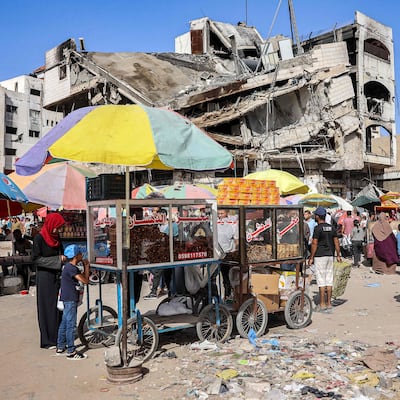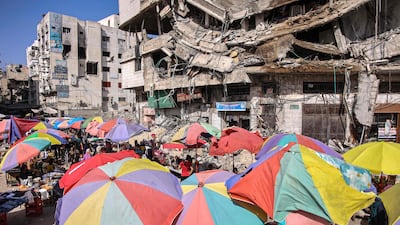Live updates: Follow the latest on Israel-Gaza
To overcome the harsh realities of war in Gaza, many residents have had to abandon their hard-earned careers in academic, medical, and other fields, seeking alternative ways to feed their families, often turning to street vending and farming.
Ahmed Hani, a 31-year-old architect from Gaza city, once thrived in the bustling world of architectural blueprints and projects that pressured him.
“I used to spend more than 10 hours a day in the office because of my love for it and the work pressure which I considered as the biggest motivation to continue working,” he told The National.
His days were filled with enjoying breakfast and laughs with his colleagues between work and driving to the project sites.
Ahmed’s journey in the world of architecture began with five years of university studies and two years of training. He gained experience and built a reputation for himself over the six years of work but his plans to one day open an office came tumbling down when the war started.
Now, his line of work has shifted dramatically.
"A few months ago, I decided to cultivate a small piece of land around our house and live off its produce," he said.
Selling the corn, parsley and courgettes he grows on his land has become his source of income, helping him to support his wife and child. But despite the difficulties, he remains hopeful.
“My dreams are many, but the main one is for the war to end and for us to return to our previous lives, we which we enjoyed so much,” he said.

Hassan Abu Auda, 29, was on a promising academic path before the war broke out on October 7. Three years ago, he obtained his master's degree and began teaching psychological counselling and education at various universities in Gaza.
"It pains me deeply every time I remember my life before the war, my ambitions, and how things were compared to how they are now," he said.
Originally from Bein Hanoun in northern Gaza, Hassan was supposed to be preparing for his PhD studies to become a lecturer. Instead, he sells ice cream in order to provide for his pregnant wife and two children.
Gaza resident
"If I had known such a war was coming, I would never have dared to bring a third child into this life in Gaza,” he said.
Mohammed Ishtaywi finds himself in a similar situation.
An English teacher from Zeitoun in Gaza city, he spent 12 years teaching in government schools and was a familiar face in the community, having worked in more than five schools.
He enjoyed working early in the mornings and said his first class of the day was always his favourite.
But the joy and the daily routines came to an end when the war started.
Schools were shut – or destroyed – and salaries stopped. Mohammed and his family of five struggled to find food. Out of necessity, he opened a small stall and sold coffee and nuts in the hope he would make enough to feed his loved ones.
The transition was difficult.
"At first, it was very difficult for me psychologically, especially with the pitying looks from people," Mohammed said.
Over time, as the war raged on, he started to adapt.
“Over time, I transformed from a teacher who wore a suit every day to work and tried to be well-groomed, using perfumes and hair gel, to a vendor standing all day at his stall,” he added.
Now, schools are being used as shelters for the thousands of people who have been displaced by fierce fighting across the besieged enclave.


